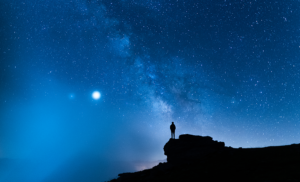Finding Awe in the Ordinary
February 24, 2023
To Inspire:

When was the last time you felt awe? Awe is defined as a feeling of reverential respect mixed with fear or wonder. But beyond the dictionary definition, awe blows us away: It reminds us that there are forces bigger than ourselves.
Last month I had the opportunity to see my favorite band perform at a 1,000-person venue and that evening included many moments of awe for me. Thinking about the show still gives me goosebumps.
But do have you have to be at a concert, or on the top of a mountain, or doing any one of the many things described as “awe inspiring” to feel this feeling? In his book “Awe,” psychology professor Dr. Dacher Keltner looks at how awe can be – and is – encountered every day in very ordinary things.
When asked to track experiences of awe in a diary, Keltner and his colleagues were surprised to find people felt awe a little more than twice a week on average. And this awe was mostly inspired by very ordinary things – a friend’s kindness and generosity, the play of light and shadow through a tree, a song that reminded them of the past.
It’s good that we can find awe in these things, as other research shows that awe can have real physical impact – reducing stress, decreasing inflammation, and benefiting the cardiovascular system.
And Keltner says we don’t have to passively wait for things to inspire awe, we can actively search it out.
One source of everyday awe was by far the most common in the diary study – other people. Things like witnessing acts of courage and simple acts of kindness inspired awe.
Another common source was just taking a walk. Walking has long been recognized as a source of everyday awe as our thoughts and body connect with nature. Walkers who were prompted with instructions guiding them to take more notice of their surroundings surprisingly reported more awe with each passing week, their capacity for awe did not decrease.
We often find inspiring stories in literature, poetry, film, and art. The arts can make us feel connected to something beyond words. Like me, many people in the diary study wrote that music brought them moments of awe. According to Keltner, “When we listen to music that moves us, dopaminergic pathways—circuitry in the brain associated with reward and pleasure—are activated, which open the mind to wonder and exploration.”
Visual arts activate the same dopamine network in your brain and can have the same effect. Exposure to paintings inspires greater creativity in people.
Maybe these things inspire awe because these experiences remind us that we’re part of something that will exist long after us.
Even experiencing awe for just a moment or two is worthwhile and the more we practice awe, the richer it gets. So, starting today, open yourself to awe wherever you can find it and search it out in your life.

Written by Michelle O’Brien, Manager of Marketing & Communications
Source: Keltner, Dacher. The Quiet Profundity of Everyday Awe, The Atlantic.